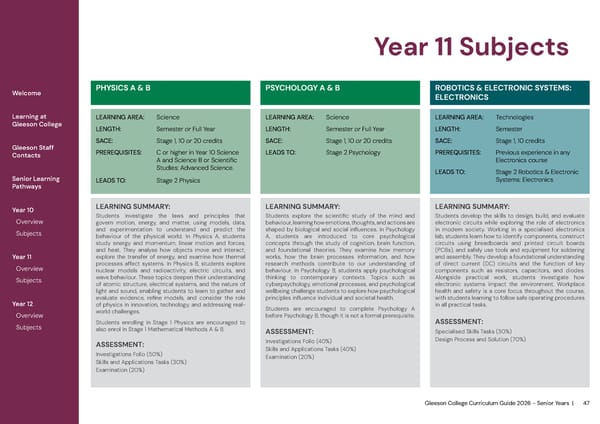Gleeson College Curriculum Guide 2026 - Senior Years | 47 Year 11 Subjects Welcome Learning at Gleeson College Gleeson Staff Contacts Senior Learning Pathways Year 10 Overview Subjects Year 11 Overview Subjects Year 12 Overview Subjects PHYSICS A & B LEARNING AREA: Science LENGTH: Semester or Full Year SACE: Stage 1, 10 or 20 credits PREREQUISITES: C or higher in Year 10 Science A and Science B or Scientific Studies: Advanced Science. LEADS TO: Stage 2 Physics LEARNING SUMMARY: Students investigate the laws and principles that govern motion, energy, and matter, using models, data, and experimentation to understand and predict the behaviour of the physical world. In Physics A, students study energy and momentum, linear motion and forces, and heat. They analyse how objects move and interact, explore the transfer of energy, and examine how thermal processes affect systems. In Physics B, students explore nuclear models and radioactivity, electric circuits, and wave behaviour. These topics deepen their understanding of atomic structure, electrical systems, and the nature of light and sound, enabling students to learn to gather and evaluate evidence, refine models, and consider the role of physics in innovation, technology, and addressing real- world challenges. Students enrolling in Stage 1 Physics are encouraged to also enrol in Stage 1 Mathematical Methods A & B. ASSESSMENT: Investigations Folio (50%) Skills and Applications Tasks (30%) Examination (20%) PSYCHOLOGY A & B LEARNING AREA: Science LENGTH: Semester or Full Year SACE: Stage 1, 10 or 20 credits LEADS TO: Stage 2 Psychology LEARNING SUMMARY: Students explore the scientific study of the mind and behaviour, learning how emotions, thoughts, and actions are shaped by biological and social influences. In Psychology A, students are introduced to core psychological concepts through the study of cognition, brain function, and foundational theories. They examine how memory works, how the brain processes information, and how research methods contribute to our understanding of behaviour. In Psychology B, students apply psychological thinking to contemporary contexts. Topics such as cyberpsychology, emotional processes, and psychological wellbeing challenge students to explore how psychological principles influence individual and societal health. Students are encouraged to complete Psychology A before Psychology B, though it is not a formal prerequisite. ASSESSMENT: Investigations Folio (40%) Skills and Applications Tasks (40%) Examination (20%) LEARNING SUMMARY: Students develop the skills to design, build, and evaluate electronic circuits while exploring the role of electronics in modern society. Working in a specialised electronics lab, students learn how to identify components, construct circuits using breadboards and printed circuit boards (PCBs), and safely use tools and equipment for soldering and assembly. They develop a foundational understanding of direct current (DC) circuits and the function of key components such as resistors, capacitors, and diodes. Alongside practical work, students investigate how electronic systems impact the environment. Workplace health and safety is a core focus throughout the course, with students learning to follow safe operating procedures in all practical tasks. ASSESSMENT: Specialised Skills Tasks (30%) Design Process and Solution (70%) ROBOTICS & ELECTRONIC SYSTEMS: ELECTRONICS LEARNING AREA: Technologies LENGTH: Semester SACE: Stage 1, 10 credits PREREQUISITES: Previous experience in any Electronics course LEADS TO: Stage 2 Robotics & Electronic Systems: Electronics
 2026 Gleeson College Senior Years Curriculum Guide 2026 Page 46 Page 48
2026 Gleeson College Senior Years Curriculum Guide 2026 Page 46 Page 48